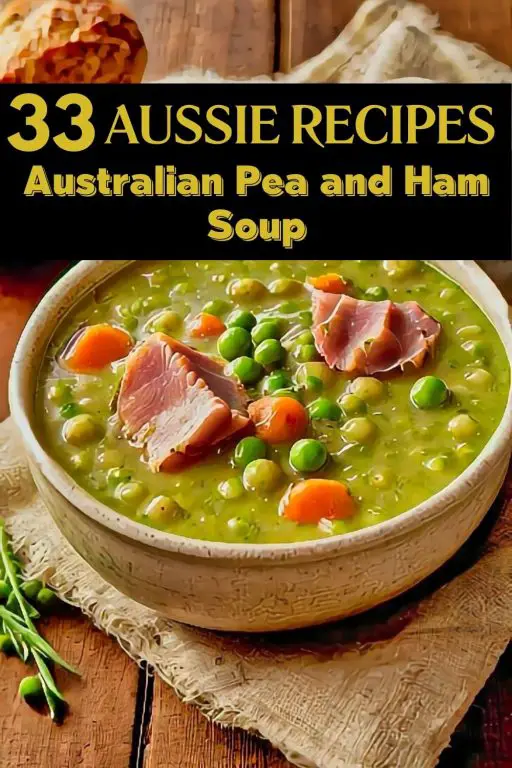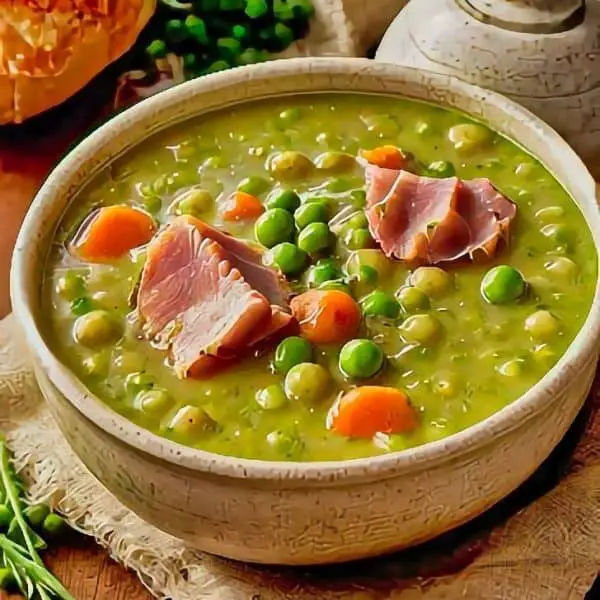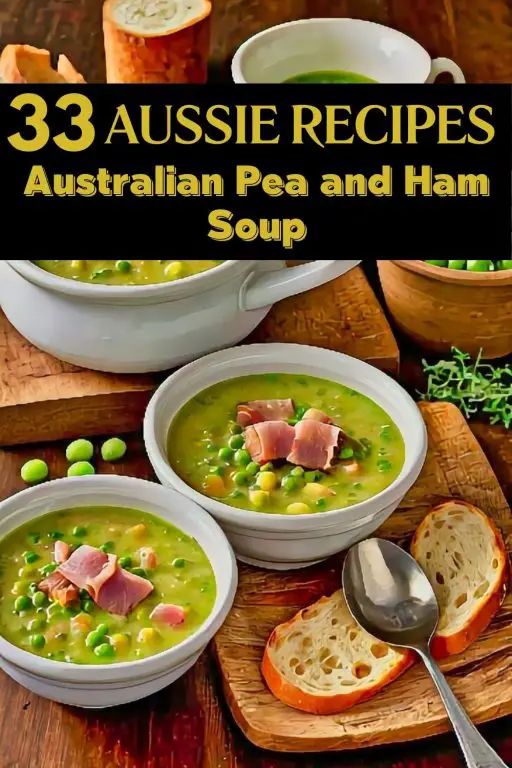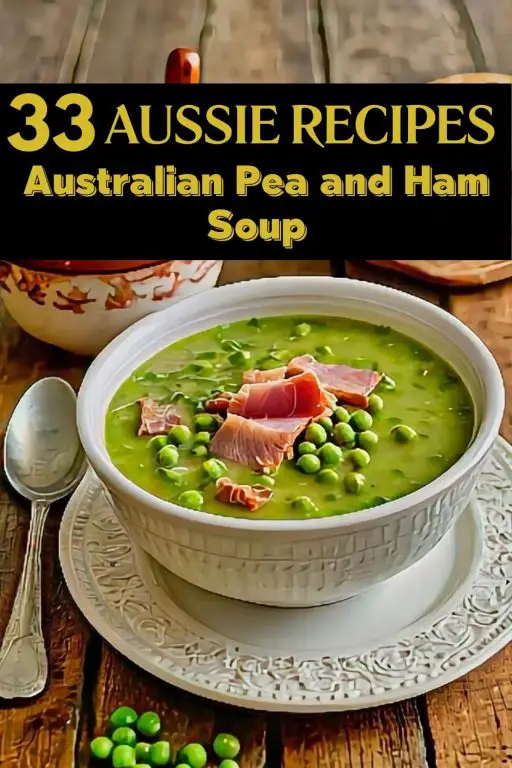The Australian Pea and Ham Soup recipe is a classic dish that I recently tried. The Australian Pea and Ham Soup recipe features a thick, hearty base with a noticeable green hue from the peas. The ham in the Australian Pea and Ham Soup recipe gives the dish a rich, savoury quality, with tender chunks scattered throughout. The smooth, creamy texture contrasts with the occasional bits of ham, making it an interesting combination of consistency and flavor.
This Australian Pea and Ham Soup recipe has a dense and almost velvety look, with a slightly rustic appearance from the peas being blended into a smooth base. The pieces of ham provide a meaty texture to balance out the otherwise smooth soup. When we received the recipe, we were given simple steps on how to recreate this soup. The Australian Pea and Ham Soup recipe demonstrated the balance between the subtle sweetness of peas and the smoky, salty presence of ham, resulting in a dish that is straightforward and satisfying.
Overall, the Australian Pea and Ham Soup recipe is a great example of a traditional soup that highlights the simplicity of combining a legume base with protein. The thick consistency makes it a hearty option for colder days. After trying it, we requested the recipe to try at home, making it clear that this dish was easy to recreate with basic cooking techniques.

Ingredients For the Australian Pea and Ham Soup Recipe
Dried Split Ppeas
Ham Hock or Gam Bone
Olive Oil
Chopped Onions
Chopped Carrots
Celery stalks
Minced Carlic cloves
Water
Bay Leaves
Salt
Pepper
Cooking Instructions For the Australian Pea and Ham Soup Recipe
- Rinse the split peas and remove any debris. Soak the peas in cold water for 1 hour or overnight.
- In a large pot, heat the olive oil over medium heat. Add the onions, carrots, celery, and garlic. Cook until the vegetables are softened, about 10 minutes.
- Drain the split peas and add them to the pot. Stir to combine with the vegetables. Add the ham hock or ham bone, water, and bay leaves to the pot. Bring to a boil, then reduce heat to low and simmer for 2-3 hours or until the peas are tender and the ham is falling off the bone.
- Remove the ham hock or bone and bay leaves from the pot. Discard the bay leaves and shred the ham into small pieces, discarding any fat or gristle. Using an immersion blender or a regular blender, puree the soup until smooth. Alternatively, leave it chunky if desired.
- Add the shredded ham back to the pot and heat until warmed through. Season with salt and pepper to taste.
10 Reasons I love Australian Food
1. Diverse Flavors: Australian cuisine reflects its multicultural heritage, incorporating influences from British, Mediterranean, Asian, and Indigenous cuisines. This blend creates a unique and varied flavour profile that appeals to a wide range of tastes.
2. Fresh Ingredients: The emphasis on fresh, high-quality produce is a cornerstone of Australian food. From farm-to-table vegetables and fruits to freshly caught seafood, Australian dishes often highlight the natural flavours of the ingredients.
3. Innovative Recipes: Australian chefs are known for their creativity and innovation. They often experiment with traditional recipes, combining local ingredients in new and exciting ways. This approach keeps the culinary scene vibrant and constantly evolving.
4. Seafood Excellence: Australia boasts some of the world’s finest seafood, including prawns, oysters, barramundi, and more. The country’s extensive coastline ensures that seafood is always fresh and features prominently in its cuisine.
5. Indigenous Ingredients: Australian cuisine includes unique Indigenous ingredients like wattleseed, bush tomatoes, and finger limes. These ingredients add distinct and traditional flavours to dishes, offering a taste of Australia’s cultural heritage.
6. Barbecue Culture: The Australian barbecue, or “barbie,” is a social and culinary highlight. It’s not just about grilling meat; it’s a communal experience that brings people together to enjoy delicious food in an informal setting.
7. Sweet Treats: Australian desserts are delightful, with iconic treats such as Pavlova, Anzac biscuits, and Lamingtons. These sweets are beloved for their taste and often evoke a sense of nostalgia and comfort.
8. Healthy Options: Australian cuisine often includes a variety of healthy options. With an emphasis on fresh produce and lean meats, many dishes are nutritious and balanced, catering to a range of dietary preferences.
9. Vibrant Food Culture: The food culture in Australia is lively and inclusive. Markets, food festivals, and diverse eateries offer opportunities to explore and enjoy a wide range of culinary experiences.
10. Local Wine: Australia is home to renowned wine regions like Barossa Valley and Margaret River. The country’s diverse climate allows for a variety of wine styles, making it a perfect accompaniment to the delicious food.
What is Bush Tucker Food in Australia
Bush tucker food in Australia refers to the traditional ingredients and culinary practices of Aboriginal Australians, showcasing the country’s unique native flora and fauna. This term encompasses a wide range of native foods that have been used by Indigenous Australians for thousands of years. Bush tucker is more than just a diet; it represents a deep connection to the land and its resources, embodying a rich heritage of knowledge and tradition.
Native plants are central to bush tucker. For instance, wattleseed is a prominent ingredient; its nutty, coffee-like flavour makes it a versatile component in both sweet and savoury dishes. Bush tomatoes, with their intense, tangy taste, and quandong, a tart fruit, are other examples of native produce used in traditional cooking. Another important plant is the finger lime, a citrus fruit that has become popular in modern cuisine for its unique texture and zesty flavour.
Animal foods also feature prominently in bush tucker. Kangaroo, a lean meat high in protein, is often cited as a staple. Emu and crocodile are also traditionally consumed, each offering distinctive flavours and textures. Aboriginal Australians have developed methods for hunting and processing these animals that are both efficient and respectful of the natural environment.
Bush tucker is not just about the food itself but also about the methods of preparation and consumption. Traditional cooking techniques include using hot coals and earth ovens, which impart unique flavours to the food. The use of these methods reflects a profound understanding of how to harness the land’s resources sustainably.
In recent years, bush tucker has gained popularity beyond Indigenous communities, influencing modern Australian cuisine. This growing interest highlights a broader appreciation for native ingredients and their role in Australia’s culinary identity.
FAQ For the Australian Pea and Ham Soup Recipe
Q: What is an Australian Pea and Ham Soup recipe?
A: An Australian Pea and Ham Soup recipe is a hearty and comforting dish made from split peas and ham, often cooked together to create a rich and flavourful soup. The Australian Pea and Ham Soup recipe typically includes ingredients like onions, carrots, celery, and herbs for added depth.
Q: What ingredients are required for an Australian Pea and Ham Soup recipe?
A: The ingredients required for an Australian Pea and Ham Soup recipe typically include dried split peas, ham hocks or ham bones, onions, carrots, celery, garlic, and various herbs and spices. The Australian Pea and Ham Soup recipe combines these ingredients to produce a satisfying and nutritious soup.
Q: How do you cook the Australian Pea and Ham Soup recipe?
A: To cook the Australian Pea and Ham Soup recipe, start by sautéing onions, carrots, and celery in a large pot. Add the ham hocks or bones and water, then bring to a boil. Add the dried split peas and simmer until the peas are tender and the ham is falling off the bone. The Australian Pea and Ham Soup recipe often benefits from a long simmer to enhance the flavours.
Q: Can the Australian Pea and Ham Soup recipe be made in advance?
A: Yes, the Australian Pea and Ham Soup recipe can be made in advance. It stores well in the refrigerator for several days and can also be frozen for longer storage. When reheating, you may need to add a bit of water or broth to achieve the desired consistency. The Australian Pea and Ham Soup recipe maintains its flavour and quality when prepared ahead of time.
Q: What are some variations of the Australian Pea and Ham Soup recipe?
A: Variations of the Australian Pea and Ham Soup recipe can include adding vegetables like potatoes, leeks, or spinach, or incorporating different spices and herbs to suit your taste. The Australian Pea and Ham Soup recipe is versatile, allowing for adjustments based on personal preferences or seasonal ingredients.

Australian Pea and Ham Soup
Equipment
- Large pot or Dutch oven
- Immersion blender or regular blender
- Cutting board and Chef's knife
- Wooden Spoon
Ingredients
- 1 lb. dried split peas
- 1 ham hock or ham bone
- 2 tbsp. olive oil
- 2 onions, chopped
- 2 carrots, peeled and chopped
- 2 celery stalks, chopped
- 3 garlic cloves, minced
- 8 cups water
- 2 2 bay leaves
- Salt and pepper, to taste
Instructions
- Rinse the split peas and remove any debris. Soak the peas in cold water for 1 hour or overnight.
- In a large pot, heat the olive oil over medium heat. Add the onions, carrots, celery, and garlic. Cook until the vegetables are softened, about 10 minutes.
- Drain the split peas and add them to the pot. Stir to combine with the vegetables.
- Add the ham hock or ham bone, water, and bay leaves to the pot. Bring to a boil, then reduce heat to low and simmer for 2-3 hours or until the peas are tender and the ham is falling off the bone.
- Remove the ham hock or bone and bay leaves from the pot. Discard the bay leaves and shred the ham into small pieces, discarding any fat or gristle.
- Using an immersion blender or a regular blender, puree the soup until smooth. Alternatively, leave it chunky if desired.
- Add the shredded ham back to the pot and heat until warmed through. Season with salt and pepper to taste.
- Serve hot and enjoy!




3 comments
A fantastic recipe that delivers on taste and ease. Loved it!
I cant get over how delicious Australian Pea and Ham Soup is! The perfect combination of flavors and textures. I could eat it every day! Who else is a fan of this Aussie classic?
I cant believe they didnt include a vegetarian version of the Australian Pea and Ham Soup recipe! Its 2021, people! We need more plant-based options. #VeggiePower 🌱
Comments are closed.